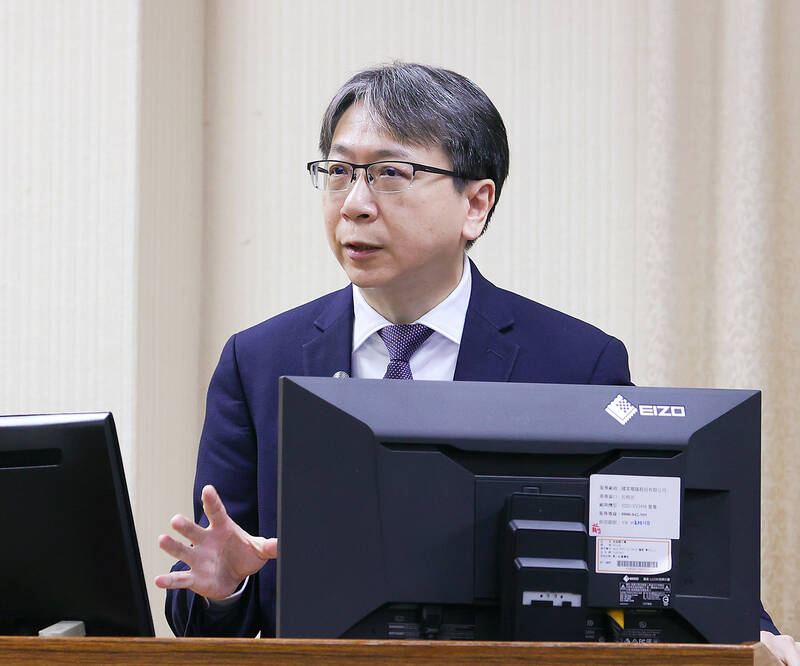China could use its self-developed generative artificial intelligence (AI) applications to intensify cognitive warfare against Taiwan, National Security Bureau Director-General Tsai Ming-yen (蔡明彥) said yesterday.
Tsai made the remarks during a meeting of the legislature’s Foreign and National Defense Committee, in which he and Overseas Community Affairs Council Minister Hsu Chia-ching (徐佳青) briefed lawmakers on how the government copes with the “hybrid threat” from China, including escalating military intimidation, increasing manipulation of controversial information, promoting unification with China and breaching key infrastructure.
The development of deepfakes, ChatGPT and social media would enable the Chinese Communist Party (CCP) to intensify cognitive warfare against Taiwan, the bureau said in a report to the committee.

Photo: CNA
“It has come to our attention that China has developed its own chatbots, such as Ernie Bot. We are closely watching whether it will use new generative AI applications in disseminating disinformation,” Tsai told reporters on the sidelines of the meeting.
Asked whether China has begun to interfere in Taiwan’s presidential election next year, Tsai said the bureau is watching whether Beijing is imposing external pressure on Taiwan through military or economic threats, whether it is trying to influence the outcome of the election through disinformation and whether it is sending funds to candidates via hidden channels or virtual currency.
Tsai also commented on former Air Force Command major Chiu Shih-ching’s (邱世卿) remark that Taipei and Hsinchu County would be the most dangerous places in Taiwan should a war break out in the Taiwan Strait.
“Deterring the occurrence of a war remains the top priority in our national defense policy. We are simulating war scenarios and preparing counterstrategies accordingly,” Tsai said.
The bureau in its report also said the CCP is using different strategies to challenge the “status quo” across the Strait and creating internal conflicts in Taiwan by exaggerating the benefits of cross-strait exchanges.
First, Beijing is creating a war atmosphere by launching military exercises around Taiwan, spreading disinformation and amplifying CCP propaganda, the bureau said.
Second, it is creating a general distrust in the US’ commitment to Taiwan by using issues such as Taiwan Semiconductor Manufacturing Co’s establishment of a chip plant in the US, it said.
Third, it is attacking or hacking into key infrastructure in Taiwan and spreading or selling stolen data online, the bureau said, adding that the extensive media coverage of the cybersecurity breaches would cause people to lose confidence in the government.
“Beijing is blaming Taipei for a slower-than-expected recovery of normal cross-strait exchanges after the COVID-19 pandemic,” it said.
“It has also announced that it is launching trade investigations into Taiwanese goods and agricultural products, which could continue until before the presidential election next year,” the bureau said.
China “has attempted to sway the political preference of Taiwanese voters and create internal conflicts, which would help it spin the cross-strait issues in its favor,” it added.
Tsai also said that he would meet with former White House National Security adviser John Bolton, who arrived in Taiwan yesterday.

Taiwan has received more than US$70 million in royalties as of the end of last year from developing the F-16V jet as countries worldwide purchase or upgrade to this popular model, government and military officials said on Saturday. Taiwan funded the development of the F-16V jet and ended up the sole investor as other countries withdrew from the program. Now the F-16V is increasingly popular and countries must pay Taiwan a percentage in royalties when they purchase new F-16V aircraft or upgrade older F-16 models. The next five years are expected to be the peak for these royalties, with Taiwan potentially earning

STAY IN YOUR LANE: As the US and Israel attack Iran, the ministry has warned China not to overstep by including Taiwanese citizens in its evacuation orders The Ministry of Foreign Affairs (MOFA) yesterday rebuked a statement by China’s embassy in Israel that it would evacuate Taiwanese holders of Chinese travel documents from Israel amid the latter’s escalating conflict with Iran. Tensions have risen across the Middle East in the wake of US and Israeli airstrikes on Iran beginning Saturday. China subsequently issued an evacuation notice for its citizens. In a news release, the Chinese embassy in Israel said holders of “Taiwan compatriot permits (台胞證)” issued to Taiwanese nationals by Chinese authorities for travel to China — could register for evacuation to Egypt. In Taipei, the ministry yesterday said Taiwan

Taiwan is awaiting official notification from the US regarding the status of the Agreement on Reciprocal Trade (ART) after the US Supreme Court ruled US President Donald Trump's global tariffs unconstitutional. Speaking to reporters before a legislative hearing today, Premier Cho Jung-tai (卓榮泰) said that Taiwan's negotiation team remains focused on ensuring that the bilateral trade deal remains intact despite the legal challenge to Trump's tariff policy. "The US has pledged to notify its trade partners once the subsequent administrative and legal processes are finalized, and that certainly includes Taiwan," Cho said when asked about opposition parties’ doubts that the ART was

If China chose to invade Taiwan tomorrow, it would only have to sever three undersea fiber-optic cable clusters to cause a data blackout, Jason Hsu (許毓仁), a senior fellow at the Hudson Institute and former Chinese Nationalist Party (KMT) legislator, told a US security panel yesterday. In a Taiwan contingency, cable disruption would be one of the earliest preinvasion actions and the signal that escalation had begun, he said, adding that Taiwan’s current cable repair capabilities are insufficient. The US-China Economic and Security Review Commission (USCC) yesterday held a hearing on US-China Competition Under the Sea, with Hsu speaking on